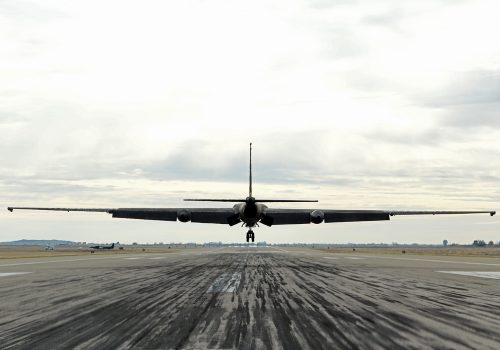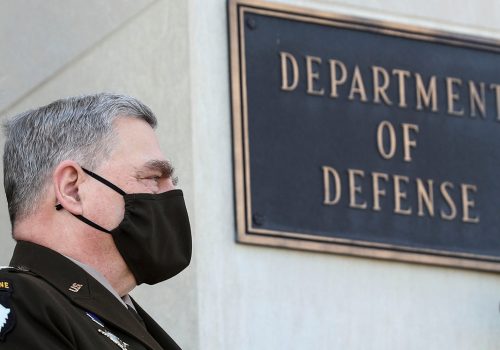Elevating ‘deterrence by denial’ in US defense strategy

The United States is at a critical strategic juncture. At the systemic level, changes in the distribution of military and economic power signal that the American unipolar moment has passed. Protecting US security and advancing US interests in an increasingly multipolar world—one defined by both rising and revanchist powers—now form the crux of what national-security commentators call “great-power competition.”
Yet the conversation around great-power competition is incomplete without considering how emerging technology and global connectivity alter the strategic landscape. In calibrating a new strategic approach to great-power competition, President Joe Biden’s administration should orient US foreign policy around the logic of a concept known as “deterrence by denial.” This means denying adversaries the ability to threaten the global connectivity on which we all rely. The concept must become a key aspect of defense strategy.
While deterrence is often associated with the nuclear standoff of the Cold War, the concept remains a cornerstone of US foreign policy. Practitioners of deterrence generally seek to maintain the status quo—to prevent a target from engaging in some undesired action it has not yet undertaken. Successful deterrence is therefore defined in negative terms. It’s reflected in the absence of activity.
Deterrence works by manipulating a target’s perception of the costs, benefits, and risks of an action. It relies on what the political scientists Alexander L. George and Richard Smoke called the “persuasion of one’s opponent that the costs and/or risks of a given course of action [they] might take outweigh its benefits.” That’s why signaling and communication are integral to the concept of deterrence. Strong signals of resolve by a country, if they’re backed up by capability, can help to convince adversaries that the costs of challenging that country are significant. Deterrence often combines negative and positive inducements—the proverbial sticks and carrots.
Historically, deterrence has come in two forms: punishment and denial. In theory and practice, countries tend to deter by focusing on imposing costs on and signaling the ability to threaten an adversary—in other words, on punishment strategies. Punishment, John J. Mearsheimer has written, often involves “threatening to destroy large portions of an opponent’s civilian population and industry,” while denial “requires convincing an opponent that he will not attain his goals on the battlefield.” Denial strategies, adds Michael J. Mazarr, “seek to deter an action by making it infeasible or unlikely to succeed.” These strategies work when a country targets an adversary’s military capabilities (in contrast to its population centers or economy) or shores up its own defenses to such an extent that offensive operations are perceived to be inordinately costly for an attacking country.
A US defense strategy based more on deterrence by denial than on punishment is best suited for contemporary strategic challenges for several reasons. Therefore, the concept should feature more prominently in US strategy, given the evolution of the international landscape.
Seizing the advantage: The next US National Defense Strategy
First, the rise of serious challengers to US military dominance reduces the already limited effectiveness of punishment-based deterrence strategies. In an environment where the United States no longer possesses decisive military advantage over its adversaries, especially China and Russia, a punishment-based approach becomes increasingly risky. This could manifest in a number of different ways. For instance, adversaries could credibly absorb or deny US attempts to impose costs, such as through anti-access area-denial capabilities, which aim to prevent the projection of adversary military capabilities to an area or restrict their movement within it. This would reduce the impact of US punishment strategies, forcing the United States to choose between accepting defeat or escalating further—with the latter presenting significant dangers, especially against two nuclear-armed adversaries. Additionally, as other countries increase their own military capabilities, they’re better positioned to impose direct military costs against the United States or indirect costs against US allies or interests. This reduces the credibility of the threat of US punishment strategies because the United States would have to convey its willingness to continue to carry out punishment approaches despite these costs. Altogether, therefore, the risks of punishment-based approaches may outweigh the benefits.
Second, emerging technology increasingly influences both national security and economic prosperity. This is especially true for information and communications technology and for new and newly important domains of warfare such as space and cyberspace. The US economy is deeply integrated with and dependent on the global economy. To provide one example, the international financial system, of which the US financial sector is the critical hub, rests on the reliable and resilient functioning of digital infrastructure, networks, and systems, making the financial system interconnected with cyberspace. And for an example from the military perspective, the United States’ precision-strike weapon systems, including nuclear command and control, depend on both cyberspace and outer space for core functions.
Complicating all of this, both the outer space and cyberspace domains rely on the private sector. For example, in cyberspace, the private sector owns and operates the majority of the networks and infrastructure. Similarly, the national power grid and transport systems are critical to the US military’s ability to deploy, and the commercial space industry is critical to America’s ability to launch satellites in volume. Therefore, both play roles in national security. The US economy and military are both vulnerable to adversaries in space and cyberspace—and defending these spaces means defending government and private infrastructure alike. A successful deterrence-by-denial strategy must include frameworks for public-private collaboration that are deeper and more meaningful than those that currently exist.
As the Biden administration reshapes foreign policy and makes decisions about how to invest in US military capabilities for the future, it should acknowledge the value of a denial-based approach to deterrence. It should invest in capabilities that enable defense and emphasize infrastructure, logistics, and partner capabilities—even if this may sometimes come at the expense of the exquisite and costly US military capabilities that are necessary for punishment-based approaches.
Erica D. Borghard is a resident senior fellow with the New American Engagement Initiative at the Scowcroft Center for Strategy and Security and was senior director on the US Cyberspace Solarium Commission.
Benjamin Jensen is a nonresident senior fellow with Forward Defense at the Atlantic Council’s Scowcroft Center for Strategy and Security, a professor at the School of Advanced Warfighting in the Marine Corps University, and a scholar-in-residence at American University’s School of International Service. He was also the senior research director and lead author for the US Cyberspace Solarium Commission.
Mark Montgomery is the senior director of the Center on Cyber and Technology Innovation and a senior fellow at the Foundation for Defense of Democracies. He serves as the senior advisor to the chairmen of the Cyberspace Solarium Commission and was the executive director.
Forward Defense’s “Seizing the Advantage: The Next US National Defense Strategy” explores the future of defense policy through frank review of current policy, cogent expert analysis of the present security environment, and actionable recommendations for a strategy to meet future defense challenges. This essay adds to a series that will offer thought-provoking commentary on how the Biden administration might effect changes in its opening days to seize the competitive advantage for the United States in ongoing great power competition.
Further reading
Image: Navy photo by Lt. J.G. Samuel Hardgrove via ABACAPRESS.COM and Reuters




